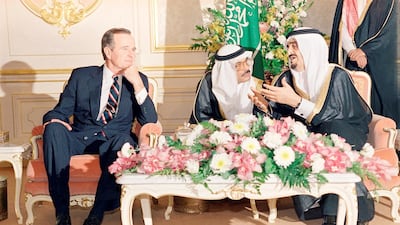George H W Bush, the 41st US president, who died on Friday at the age of 94, was deeply involved in oil throughout his life. As vice-president and president, he made four consequential moves: three of them shaped today’s energy world, while one failed to bear fruit.
Bush, son of a US senator, was a naval aviator in the Second World War. In 1953, having graduated from Yale, he co-founded the Zapata Petroleum Corporation, which drilled in Texas's Permian Basin. Decades before the current shale boom, the Permian was enjoying its first lease on life as the US's premier oil region. Among the investors in Zapata was Jimmy Gammell, father of Bill Gammell, the founder of Cairn Energy and confidant of Tony Blair's. Zapata pioneered offshore drilling, and branched out internationally; one of its contracts was to drill in Kuwait for Shell.
Bush Senior sold his shares in Zapata in 1966 when he went into politics, entering the House of Representatives, running for the Senate, becoming ambassador to the UN and China, then director of the CIA and finally Ronald Reagan’s vice-president. His son, George W Bush, also ventured into oil, founding Arbusto Energy in 1979, and with Bill Gammell as an investor, but was unsuccessful.
Presidents Nixon, Ford and Carter through the 1970s had contended with the energy crisis, bringing high fuel bills, stagflation and long lines at petrol stations due to failed price controls. Reagan deregulated the domestic oil and gas market. Economically, he largely accidentally reaped the benefits of falling oil prices, as new oil from the North Sea, Mexico and Alaska, along with improved efficiency, broke Opec’s grip for a generation. But probably not since the Teapot Dome scandal under Warren Harding in the 1920s had a president been so personally concerned in oil as Bush Senior.
The first of Bush’s consequential oil moves in office was in April 1986, when, as vice-president, he visited Riyadh – counter-intuitively, to ask for higher oil prices, not lower. He had become concerned about the impact of the oil price slump on the economy of petro-states such as Texas, and on US oil output and hence national security.
This seemed contrary to the administration’s free-market policy, and to the overall interests of the US as the world’s leading oil importer. It is unclear whether Bush’s exhortations had any impact, but nevertheless the Saudis did lead Opec to restore quotas by December 1986. Prices slowly recovered.
Riyadh and Washington had been close partners since 1945, and presidents had lectured Saudi Arabia on the need to bring down oil prices before, and would do so again. This episode, though, set the stage for close personal relationships with the royal family, which have endured under subsequent administrations.
_______________
Read more:
Slide in oil prices unlikely to last
US shale will be hurt the most from low oil prices, say analysts
Oil hits 2018 lows on emerging supply surplus
_______________
Elected as president in 1988 despite involvement in the Iran-Contra scandal, Mr Bush’s second act came with Iraq’s 1990 invasion of Kuwait. The attack brought Saddam Hussein control of nearly 20 percent of Opec production, and the ability to intimidate Saudi Arabia and other neighbours. This could have curbed the overproduction that was driving down prices, and making it impossible for Baghdad to service its war debts. Although the US had supported Saddam against Tehran, the prospect of his regional and petroleum dominance was intolerable.
The US had steadily expanded its Gulf presence during the 1980s, first with the Carter doctrine’s promising a military response to any attempt to control the region, then with the naval effort to safeguard navigation during the “tanker war” phase of the Iran-Iraq war. The last Second World War veteran president, Bush was determined to uphold post-war international norms against territorial aggression.
The US shepherded a diplomatic and military effort with such unlikely partners as Saudi Arabia, Turkey, Syria and Egypt. But he halted the American advance short of Baghdad, and the uprising against Saddam failed for lack of US support. Mr Bush bequeathed to his successor, Bill Clinton, a permanent US military presence in the Gulf, a humanitarian disaster of sanctions, and an incoherent strategy that became the contradiction of simultaneous “dual containment” of two deadly enemies, Iran and Iraq. Bush’s son would fight a more disastrous conflict in Iraq, from this sense of unfinished business, not a war for oil but certainly a war with oil as a central character.
Meanwhile, the mid-80s slump in oil prices had undermined the Soviet economy. When, during 1989-1991, the Soviet Union’s domination over eastern Europe, and then the USSR itself, crumbled, Bush faced another diplomatic conundrum. His team ably navigated this without provoking a major conflict. The chaotic privatisations, massive petroleum deals with western firms, nationalisations, the surge of new oil and gas exports, and the rise of kleptocratic rentier autocracies in the post-Soviet space, awaited the next two presidents.
The final of Mr Bush’s four key energy actions was the one that did not bear fruit. Congressional hearings in 1988 put climate change as a top issue, and started the path leading to the Kyoto Protocol and the first global attempts to reduce greenhouse gases.
But after the Gulf War oil-price shock induced recession, he lost re-election in 1992, the Republican party abandoned science as an element of policy, and effective action on climate became impossible. George H W Bush founded a personal, not a political, dynasty. The oil market, the Middle East and the environment live with those consequences today.
Robin M. Mills is CEO of Qamar Energy, and author of The Myth of the Oil Crisis


